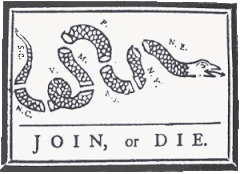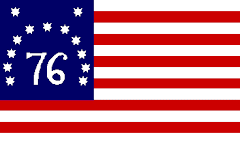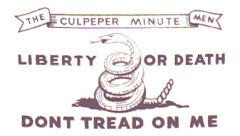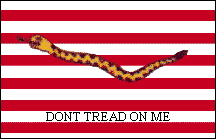In a few days our beloved Republic, the dream of our forefathers, will be saved – or it will be lost.
Seldom in its history has a battle been fought upon which the future of the country so soundly rests; never has its fate been more assuredly determined as it will be when the last polls close in the far western reaches of the United States of America on November 2, 2010.
The closest we’ve ever come to political extinction, to being just a noble experiment in democracy wherein free men were the rulers and not the ruled, was in July of 1863 - when the Army of the Republic came within a whisker of defeat at a bloody battle in a small Pennsylvania town called Gettysburg.
 There, on the second day of the three-day battle, on a small hill that came to be called Little Round Top, Colonel Joshua Chamberlain was tasked with defending the extreme left flank of the Union Army with a handful of men known as the 20th Maine Volunteer Infantry Regiment.
There, on the second day of the three-day battle, on a small hill that came to be called Little Round Top, Colonel Joshua Chamberlain was tasked with defending the extreme left flank of the Union Army with a handful of men known as the 20th Maine Volunteer Infantry Regiment.They were citizen soldiers, barely trained, hardly battle-hardened, and could not have known when they enlisted that upon their simple shoulders would rest the fate of a nation, and because of their courage, and their courage only, a nation would endure.
Politics played no less a role in America in the 1860’s than it does today; support for the war in the North was waning as the Union Army was dealt a series of stinging defeats; now, the Army of Northern Virginia, led by the seemingly invincible Robert E. Lee, had advanced further north than at any time since the war’s inception, and defeat in Pennsylvania would put Philadelphia, Baltimore and even Washington, D.C. in jeopardy. Fear was spreading; panic was waiting in the wings. A defeat here would force Lincoln much closer to a compromise with the Confederacy, and the very real possibility of military disaster loomed. It was not a far stretch to say that the preservation of the Union was at stake.
So it was that on June 30, 1863, one of Lee’s officers sent a foraging party into that small crossroads town – in search of shoes. And because upon such tiny hinges do the doors of world-historical events open and shut, the Rebels spied elements of Union cavalry arriving south of town, and reported back to their commanding officer, General A.P. Hill. Hill decided to send a reconnaissance-in-force, about two brigades, into the town the next day, to see if he was dealing with nothing more than a troublesome Pennsylvania militia, or perhaps something else - something unexpected.
It would require a great deal of time, space and most importantly research, to properly recount the events of July 1st, 1863 in the ridges and hills west of Gettysburg, and those events are not to the purpose of this writing. What happened the following day is, because it illustrates how a small band of determined men, armed with little more than a belief in their cause, rose up to defend the nation and Constitution in which they so firmly believed.
 That Thursday morning the Union army, under General George Meade, found themselves strung out in a defensive position along a line of high ground ominously known as Cemetery Ridge. They faced west, and the ridge was anchored on the southern end, their left flank, by Little Round Top, where the defensive line was arrayed in such a way as to resemble a fishhook. The last element at the end of that hook was the 20th Maine. Should they be dislodged from that position, the entire Union line could be rolled up and occupied by the Confederates, and it is unlikely that they would ever be removed. A loss at Gettysburg, and the history of this nation would be forever altered.
That Thursday morning the Union army, under General George Meade, found themselves strung out in a defensive position along a line of high ground ominously known as Cemetery Ridge. They faced west, and the ridge was anchored on the southern end, their left flank, by Little Round Top, where the defensive line was arrayed in such a way as to resemble a fishhook. The last element at the end of that hook was the 20th Maine. Should they be dislodged from that position, the entire Union line could be rolled up and occupied by the Confederates, and it is unlikely that they would ever be removed. A loss at Gettysburg, and the history of this nation would be forever altered. Starting at 4:00 PM, the rebels pounded away at that left flank, led by the 15th Alabama. Over and over they charged up that hill, and over and over they were repulsed by blistering fire from the 20th on the Union flank; so thick was the shot that the tens of thousands of rounds of Minie balls cut down swaths of trees – and swaths of men fighting and dying for their cause. Death did not choose a side.
Starting at 4:00 PM, the rebels pounded away at that left flank, led by the 15th Alabama. Over and over they charged up that hill, and over and over they were repulsed by blistering fire from the 20th on the Union flank; so thick was the shot that the tens of thousands of rounds of Minie balls cut down swaths of trees – and swaths of men fighting and dying for their cause. Death did not choose a side.After ninety minutes, the 20th Maine was worn out, and worse, without ammunition. But still there was fight in them – still they would refuse to surrender the cause. Knowing that they could not withstand another assault, with desperation the word went up and down the line, which had now been stretched to single file along the prow of the hill: “Fix bayonets!”
In one of the most improbable counter-attacks in the history of the United States military, the 20th Maine charged down the hill towards the Rebel line without bullets: armed with nothing but raw courage and sharp steel. As shocking as the charge was to the enemy, equally shocking was the result – the Confederates could not withstand the surprise attack, and slowly, then more quickly, began to give ground. It turned into a rout, and by daybreak the stage had been set for the final act in the battle that changed the course of the war.
Unable to dislodge the Union army from the left flank of the line, Lee decided that on the third day he would attack the center, in a desperate winner-take-all gambit. The charge would be led, with pride, by General George Edward Pickett.
We all know the outcome.I wish we knew the outcome of the battle that will be fought on the first Tuesday of November - but we do not. Like the 20th Maine. we are running low on ammunition; like the 20th Maine, we face a determined foe; and like the 20th Maine, we refuse to lose.
We refuse to allow those who would attack our freedoms and our Constitution to take the high ground. We refuse to become discouraged, to lose heart, to succumb to the relentless attack on our beliefs. We, like the 20th Maine, must find the courage and determination to rise up, to exhort our neighbors to join our common cause as if the fate of the Republic were at stake - because it just might be.
The battle is in scant days. Fix bayonets.
Yours in Liberty,
Frank Santarpia
Staten Island, NY







